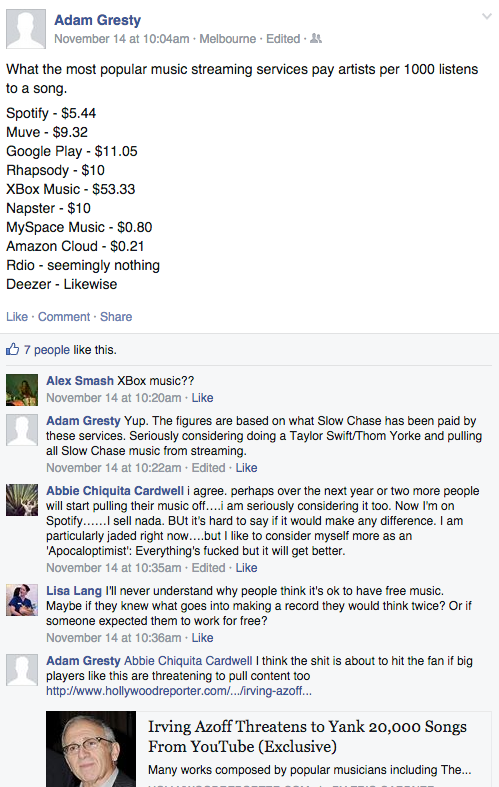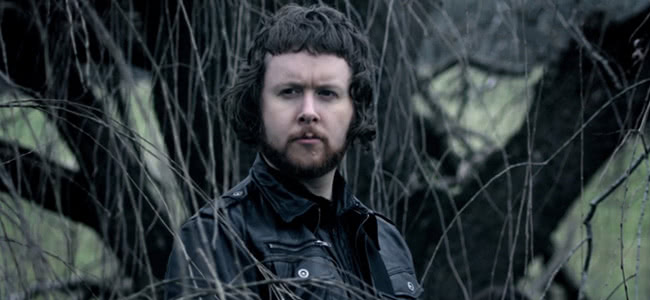You may know Abbie Cardwell as 2002’s Triple J Unearthed winner, or perhaps as a member of Keith Urban’s team on the first season of The Voice Australia. However, Cardwell’s name was most recently thrust into the headlines after she made a Facebook post about streaming royalty rates.
In the post, which was subsequently picked up by several publications including Tone Deaf, Cardwell highlighted the “current hostile climate of today’s attitude towards artists” by sharing the pay rates of several popular streaming services, illustrating how little money ends up in the artist’s pocket.
The results were frightening for anyone looking to pursue a career in the music industry. Though Xbox Music allegedly offers artists a relatively generous $50 for every 1,000 plays, most come in at around the $10 mark or otherwise offer less than one cent per play.
As Tone Deaf noted, Cardwell did not provide a source for the numbers quoted. In her post, which at the time of publication has accrued over 200 likes and numerous supportive comments, the singer writes that the figures show what streaming services pay “we musicians” and “artists” for every 1,000 listens.
However, the “musicians” in question are in fact Melbourne rockers Slow Chase. The figures used by Cardwell in her post appear to be cribbed from a post made by the band’s frontman, Adam Gresty, on his personal Facebook page.
[include_post id=”425956″]
“I don’t think Abbie meant any harm by it, but the irony of a fellow musician reposting a Facebook status without permission in a debate about digital rights and piracy and streaming vs downloads isn’t lost on me, that’s for sure,” Adam tells Tone Deaf.
“Unfortunately, she’s reposted the figures that I worked out from my Spotify and streaming service royalty payments and she’s reposted it verbatim,” he adds. “I know Abbie, I used to do some digital marketing for her music, so she’s an acquaintance and I’m sure she didn’t mean any harm by it.”
In fact, while Adam admits he would’ve preferred if Cardwell check with him before reposting the figures, he says “it’s not really got anything to do with Slow Chase”. Though he says, “I don’t particularly agree with the overall tone [of Abbie’s post].”
“I think [Abbie’s] sort of lashed out a little bit, there’s this sort of slight victim mentality,” he adds. “I’m not anti-streaming at all, let’s make that clear. I think streaming or on-demand is the future.”
“There’s been a battle for where music sits and it’s a battle for the mobile phone and what Spotify and other streaming services have done is sell the dream of a service that neatly sidesteps the problem of piracy.”
[include_post id=”421323″]
“I think in the gold rush for a solution to piracy, the artists have got trampled and they’re not getting acknowledged financially at the level that they should be,” he continues. “My suspicion with Spotify is not just about how much they’re paying artists, it’s to do with what their vision is.”
And it’s issues such as this that Adam is more concerned about. “[Spotify have] been hiring a lot of people with experience in floating companies and taking companies to an IPO and my suspicion is that the people on the board and their investors are looking to become billionaires overnight by floating the company,” he explains.
“I don’t see anything that suggests that they’re looking for a longterm solution to piracy and that they’re looking to grow the music industry. That’s really where I was coming from with posting about it. It wasn’t sort of like a ‘Wah wah, look how musicians don’t get paid anything.’ I think streaming is definitely the future.”
Adam also says that Cardwell has been in touch to apologise. “I don’t think she meant any harm by it,” he says. “[I was just struck by] the irony of… if musicians can’t even acknowledge each other’s work, I don’t know what hope we’ve got of multinational corporations doing the same.”





































